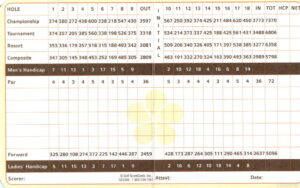
This is going to happen to all of us this golf season. And I bet it has happened to you in the past too. It’s certainly happened to me, and more than once.
We’re playing well, really well, maybe better than we ever have before. We know we are going to have one of, it not our best, scores ever…
Then we blow up.
We have a dreaded snowman– an 8! Two balls in the water, or over the fence. Even worse, we hit so many shots that we don’t even bother to finish the hole. We just pick up if it’s a causal round.<
The collapse seems to have come without warning.
There are three common reasons the coaches I talked to say this happens to us, particularly to recreational women players who we all know are more self-conscious about their play and how it looks to those around them. And, there is a lot of research to support the observations and recommendations below, which I got from both coaches and certified golf fitness trainers.
The common causes of playing collapses I was told involve outcome thinking, hydration, and playing with clubs for which you are not fitted. All or maybe just one might be the culprit in any given collapse.
1. Playing Against the Scorecard

That’s the advice most all teaching pros will give you. And, it was well said in an article I found in Psychology Today by Jim Taylor, Ph.D entitled “In Sports, Results Matter, But to Get Them, Ignore Them”.
Taylor wrote “Having an outcome focus actually reduces the chances of your achieving the results you want.”
Here’s why. First, when does the outcome of a competition occur? At the end, of course. If you’re focused on the outcome, you aren’t focused on the process, namely, what you need to do to perform your best from the start to the finish of the competition.
“In contrast, when you focus on the process, you increase your chances of getting the results you want. If you focus on the process, that is, what you need to do to perform your best, how you are likely going to perform? Pretty well, you can assume. And if you perform well, you’re more likely to achieve the result you wanted in the first place.”
So, when you are playing well stay focused on the shot at hand. Don’t think ahead— stay in the present.
This is also one of key component in the book The 8 Traits Of Champion Golfers: How To Develop The Mental Game Of A Pro, which I have mentioned in prior posts.
2. Drink Up

But are you properly hydrated on the final holes of your round?
The optimal amount of water to drink is one-half your body weight (pounds) in ounces per day. For example, a 200-pound person will need to drink 100 ounces of water per day. A key point to remember is that other fluids do not count toward your goal of half of your bodyweight in ounces, says Las Vegas-based T.J. MacPherson, who trains both amateur and professional golfers and is certified by the Titleist Performance Institute (TPI). Those fluids include: coffee, tea, juices, soda, milk, sports drinks, and flavored water. In fact, other fluids like sports drinks and juices can actually dehydrate the body because it takes water to actually dilute these high sugar drinks before it is assimilated in the body, says MacPherson.
Timing of water consumption is important to optimal hydration, TPI advises. Drinking water first thing in the morning is critical because during sleep the body becomes dehydrated. Therefore, drinking water first thing in the morning is the first step to optimal hydration. I’ve been reading for years how you should start your day with a glass of water, and you can even add a hint of lemon. I get it. Start with 25 percent of your total water intake in the morning. If your water intake for the day is 100 ounces, you would consume 25 ounces in the morning. During a golf round you should consume 40 – 50 percent of your total daily intake of water. If your water intake for the day is 100 ounces, you would consume 40-50 ounces of water on the golf course. The remaining water should be consumed throughout the day.
In summer and shoulder season heat in desert climates, add another 25 percent of your weight in ounces during play, MacPherson advises.
The type of water you drink is important to achieving optimal hydration. Most bottled waters are filtered tap waters. Choose a bottled water that has approximately 200-300 parts per million (mg/L) of dissolved solids. This ensures a proper amount of dissolved solids in the water to maintain proper hydration. High quality water sources include Evian, Fiji, and Trinity. Water from Reverse Osmosis units can be used but the dissolved solids can be quite low. A great way to remedy this situation is to add a small pinch of sea salt to every liter of water. Celtic Sea Salt is one brand to consider— it’s an organic, unrefined sea salt that has over 80 trace minerals that will help replenish your electrolytes. Salt also helps prevent muscle cramps.
3. Ill-Fitted Clubs

That’s important to note because “fatigue affects the physical and mental capacity of a person to perform set tasks”, according to the exercise physicians at North Sydney Sports Medicine.
So having clubs fit to your swing may not make much of a difference at the beginning of your round. However, by using them they will make you more tired than fitted clubs. Eventually, you will find it harder to swing well, struggle to maintain concentration, keep your confidence and think clearly as you close in on that record-low score.
Thanks for tuning in! If you find yourself digging my blog, please feel free to forward it to a friend who might also enjoy it.As always, I would love to hear from you — feel free to shoot me an email to blake@thewomangolfer.com with any questions, comments or suggestions for future posts.



